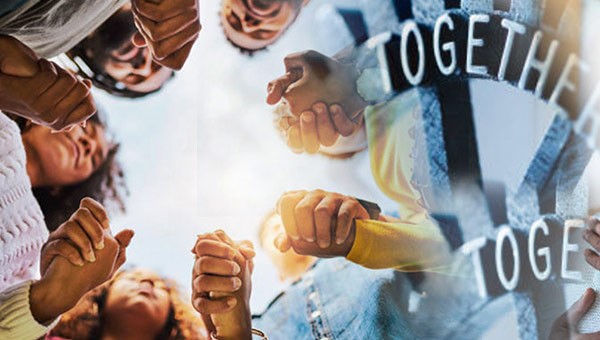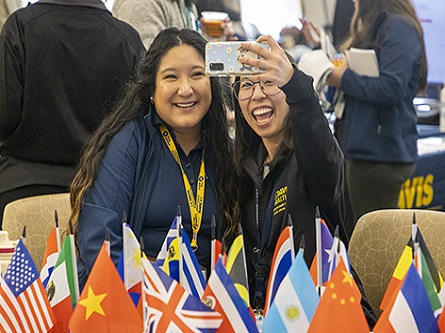Originally published on May 4, 2022.
Asian Pacific American Heritage Month and Jewish American Heritage Month take place in May, along with Cinco de Mayo and Eid al-Fitr. While we turn the spotlight to these events of multicultural significance, it’s also important to recognize the many heritage, cultural and religious events that occur throughout the year.
By Hendry Ton, M.D., MS
Associate Vice Chancellor for Health Equity, Diversity, and Inclusion
Office for Health Equity, Diversity and Inclusion (within ODEI)
University of California, Davis Health
Pronouns: he/him
Dear Colleagues,
At UC Davis Health, we value the profound nature of diverse cultures – and that is why May is such an inspiring month in a yearlong celebration of our unique humanity.
Asian Pacific American Heritage Month and Jewish American Heritage Month are both in May – we celebrated Eid al-Fitr on May 2-3 and look forward to Cinco de Mayo on May 5. Every month and every day, in fact, is important to raising awareness about cultures and people from all backgrounds.
With this in mind, we turn the spotlight in May to events of multicultural significance, while recognizing the many various heritage, cultural and religious events that happen throughout the year – Pride Month (June), Hispanic Heritage Month (Sept. 15 – Oct. 15), Native American/American Indian Heritage Month (November), African American/Black History Month (February), Women’s History Month (March), among many other days, including Juneteenth on June 20. In April, we celebrated Arab-American Heritage Month, Ramadan, Easter, and Passover.
To learn more about related issues around diversity, I encourage you to check out our Employee Resource Groups, student interest groups, and information from our resource centers. The foundation of our health system is the inherent goodness and dignity of each one of us, and this is what our efforts in diversity, equity and inclusion represent in the big picture.
We’re all in this together. It’s in our UC Davis Health scientists working in labs, the health care professionals in the front lines, working around the clock to care for people’s health. And it’s in our students learning about health and health care, and our staff supporting all these endeavors as we grow a greater health system, one that can reach those who are underserved and facing health inequities. Our Anchor Institution Mission reflects our commitment locally to helping our surrounding communities by leveraging our economic resources to build prosperity for those hard hit by economic distress and expand access to health care to those who often face obstacles.
Heritage months are an important reminder of just how much strength we draw as a nation from our multicultural roots and our values as a nation of diverse peoples. Our country owes a great deal to all of these groups who have made tremendous contributions to our history. Each has a history of achievement, resilience, and success that we should celebrate. But for many, there is also a history of profound suffering, loss, and barriers to life, wellness, and prosperity.
This past week underscored the importance of remembering this history.
On April 27-28, we recognized Yom HaShoah, which was newly established as the Days Of Remembrance Of Victims Of The Holocaust by presidential proclamation. We honored and stood with the many Jewish people within UC Davis Health and beyond as Jewish communities all over the world mourned the six million Jewish lives lost during the Holocaust and their survivors. UC Davis Health stands united against hatred in all its forms, and we work to uplift and support those who face and have faced such these terrible consequences of hate and bias.
As Elie Wiesel once said, “The opposite of love is not hate, it’s indifference. The opposite of art is not ugliness, it’s indifference. The opposite of faith is not heresy, it’s indifference. And the opposite of life is not death, it's indifference.”
To that end, we commit to the hard and ongoing work to become a fully equitable and just health system. We will continue to celebrate the wonders of our multicultural communities AND we are working even harder to break down barriers and overcome individual and systemic biases that prevent people from realizing their full potential, access the quality health care that they deserve, and improve their lives in meaningful ways.
For example, we are tackling poverty and food insecurity through our AIM for Community Health Initiative, developing the some of the nation’s most diverse cohorts health care professionals through our medical and nursing schools, advancing racial equity through our Health Equity and Racial Justice Report Card Action Plans (Racial Justice Dashboard), and training health systems to provide culturally appropriate and community-oriented care through our Center for Reducing Health Disparities. In this and beyond, so much more work remains to be done, and this is our call to action.
Yours in health,
Hendry Ton
Associate Vice Chancellor for Health Equity, Diversity and Inclusion





